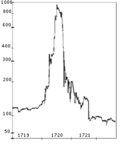Portal:Business
The Business and Economics Portal  Business is the practice of making one's living or making money by producing or buying and selling products (such as goods and services). It is also "any activity or enterprise entered into for profit." A business entity is not necessarily separate from the owner and the creditors can hold the owner liable for debts the business has acquired except for limited liability company. The taxation system for businesses is different from that of the corporates. A business structure does not allow for corporate tax rates. The proprietor is personally taxed on all income from the business. A distinction is made in law and public offices between the term business and a company (such as a corporation or cooperative). Colloquially, the terms are used interchangeably. (Full article...) Economics (/ˌɛkəˈnɒmɪks, ˌiːkə-/) is a social science that studies the production, distribution, and consumption of goods and services. Economics focuses on the behaviour and interactions of economic agents and how economies work. Microeconomics analyses what is viewed as basic elements within economies, including individual agents and markets, their interactions, and the outcomes of interactions. Individual agents may include, for example, households, firms, buyers, and sellers. Macroeconomics analyses economies as systems where production, distribution, consumption, savings, and investment expenditure interact; and the factors of production affecting them, such as: labour, capital, land, and enterprise, inflation, economic growth, and public policies that impact these elements. It also seeks to analyse and describe the global economy. (Full article...) Selected articleSociété Générale S.A. (French: [sɔsjete ʒeneʁal]), colloquially known in English-speaking countries as SocGen (pronounced [sɔk ʒɛn]), is a French multinational universal bank and financial services company founded in 1864. It is registered in downtown Paris and headquartered nearby in La Défense. Société Générale is France's third largest bank by total assets after BNP Paribas and Crédit Agricole. It is also the sixth largest bank in Europe and the world's eighteenth. It is considered to be a systemically important bank by the Financial Stability Board. It has been designated as a Significant Institution since the entry into force of European Banking Supervision in late 2014, and as a consequence is directly supervised by the European Central Bank. From 1966 to 2003 it was known as one of the Trois Vieilles ("Old Three") major French commercial banks, along with Banque Nationale de Paris (from 2000 BNP Paribas) and Crédit Lyonnais. (Full article...) Selected image
Selected economyThe economy of Morocco is a market economy, governed by the law of supply and demand. Since 1993, in line with many Western world changes, Morocco has followed a policy of privatisation. Morocco has become a major player in African economic affairs, and is the 6th largest African economy by GDP (PPP). The World Economic Forum placed Morocco as the most competitive economy in North Africa, in its African Competitiveness Report 2014–2015. The economic system of the country demonstrated resilience to the climate, commodity, and pandemic shocks of the early 2020s. As of 2022, Morocco had the eighth-highest GDP in the Arab world, despite not being a significant oil-producing country. Since the early-1980s, the Moroccan government has pursued an economic programme toward accelerating economic growth with the support of the International Monetary Fund, the World Bank, and the Paris Club of creditors. From 2018, the country's currency, the Moroccan dirham, is fully convertible for current account transactions; reforms of the financial sector have been implemented; and state enterprises are being privatised. (Full article...) Selected quote" Monopolistic competition is a challenge to the traditional viewpoint of economics that competition and monopoly are alternatives and that individual prices are to be explained in terms of either the one or the other. By contrast, it is held that most economic situations are composites of both competition and monopoly, and that, wherever this is the case, a false view is given by neglecting either one of the two forces and regarding the situation as made up entirely of the other. This seems to be a very simple idea. Indeed if one is not quite set in the way of thinking which involves mutual exclusiveness, it is grasped at once."
TopicsRelated WikiProjectsDid you know (auto-generated) -
On this day in business history
General imagesThe following are images from various business-related articles on Wikipedia.
More did you know
Business news
SubcategoriesRelated portals
Things you can doUrgent and important articles are bold
WikimediaThe following Wikimedia Foundation sister projects provide more on this subject:
SourcesDiscover Wikipedia using portals |









































